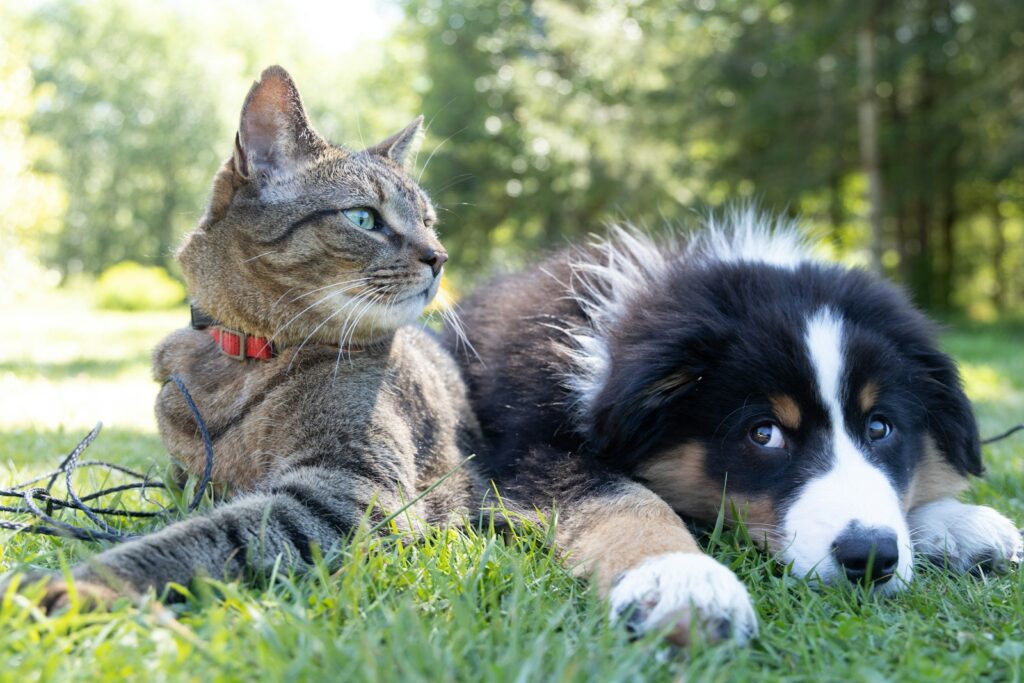When it comes to our beloved pets, we want nothing but the best for them. This includes the food they eat. Feeding dogs and cats natural foods not only enhances their well-being but also brings them closer to their wild roots. You might be surprised by the variety of natural foods that can be beneficial for your furry friends. So, let’s dive into the world of natural pet nutrition and discover which items can keep them happy and healthy!
From vibrant fruits to protein-rich meats, the journey to optimal pet health is simpler (and tastier) than you might think. Ready to learn more? Let’s get started!
Best Natural Food For Pets
Ensuring your pets get the best natural food can significantly impact their overall health and longevity. You might be wondering where to start; don’t worry, we’ve got you covered. Here are some top choices:
1. Fresh Meat and Fish
Both dogs and cats thrive on high-protein diets. Fresh meat, like chicken or beef, and fish such as salmon, are excellent choices. These protein-rich foods support muscle growth and repair, keeping your furry friend active and strong.
2. Vegetables
Don’t underestimate the power of vegetables. Carrots, sweet potatoes, and zucchini can provide essential vitamins and minerals. They are particularly good for dogs, offering fiber and antioxidants while promoting good digestion and overall health.
3. Fruits
Fruits like blueberries, apples (without seeds), and bananas can be great natural treats. They are packed with vitamins, fiber, and antioxidants, which help in boosting your pet’s immune system.
4. Grains and Legumes
For those not following a grain-free diet, whole grains like brown rice, quinoa, and oats are excellent sources of energy. Additionally, legumes like lentils and peas can provide quality proteins and essential nutrients.
5. Natural Supplements
Consider adding supplements like fish oil or turmeric. These can improve coat health, reduce inflammation, and support joint health, especially in older pets with arthritis. Always consult your veterinarian before adding any supplements to your pet’s diet.
Remember, every pet is unique. Pay close attention to your pet’s reactions to different foods and adjust their diet as needed. By choosing natural, nutrient-rich foods, you’ll help ensure your pets lead a happy, healthy life.
How should these natural foods be prepared and served?
Steaming these vegetables can make them easier to digest while retaining most of their nutrients. For fruits such as apples and blueberries, make sure to remove any seeds or pits, as these can be toxic to pets. Apples should be cored and sliced, while blueberries can be served whole. Always introduce new fruits gradually to monitor for any adverse reactions. Lean meats like chicken, turkey, and beef should be cooked thoroughly to eliminate any potential bacteria or parasites. Avoid seasoning the meat with salt, garlic, or onions, as these can be harmful to pets. Shred or dice the meat into small, manageable pieces before serving.
Fish such as salmon can be an excellent source of omega-3 fatty acids, but it’s important to cook it well and remove all bones to prevent choking. Steaming or baking the fish without any added oils or spices is the best preparation method. Eggs are a great source of protein and can be served scrambled or boiled. Make sure the eggs are fully cooked to avoid the risk of salmonella. Avoid adding any salt or butter during preparation. Plain yogurt can be a beneficial probiotic for your pets. Opt for unsweetened, unflavored varieties to avoid added sugars and artificial ingredients. A small spoonful mixed into their regular food can aid in digestion.
Pumpkin is excellent for digestive health and can be served cooked and pureed. Make sure to use plain pumpkin without any added sugars or spices. A tablespoon mixed into their food can help with both diarrhea and constipation. Oatmeal is a good source of fiber and can be served cooked and plain. Avoid adding any sweeteners or milk. Let the oatmeal cool before serving to prevent burns. Sweet potatoes are rich in vitamins and can be served cooked and mashed. Remove the skin and avoid adding any butter or seasoning. Sweet potatoes should be introduced gradually to ensure they don’t cause any digestive upset.
Brown rice is a healthy carbohydrate option that can be served cooked and plain. Make sure the rice is fully cooked and soft to make it easier for your pets to chew and digest. Mixing a small amount into their regular food can provide additional energy and nutrients.
- Oatmeal is another grain that provides fiber and can aid in digestion.
- Quinoa is high in protein and can be a great alternative to traditional grains.
- Lentils and beans are rich in protein and iron but should be cooked thoroughly.
- Sweet potatoes are a nutrient-dense source of carbohydrates and can be cooked and mashed for easy consumption.
- Barley is easy to digest and can provide energy and nutrients when cooked properly.
What are the nutritional benefits of each recommended natural food?
Carrots are a fantastic natural food for both dogs and cats. They are rich in beta-carotene, which is converted into vitamin A in the body. Vitamin A is essential for maintaining healthy vision, skin, and immune function. Additionally, the fiber content in carrots aids in digestion and can help keep your pet’s teeth clean by reducing plaque buildup. Blueberries are packed with antioxidants, vitamins C and K, and fiber. These small fruits can help boost your pet’s immune system, reduce inflammation, and support overall cellular health. The antioxidants in blueberries are particularly beneficial for aging pets, as they can help combat oxidative stress and promote cognitive function.
Pumpkin is an excellent source of fiber and essential vitamins like A, C, and E. It is particularly beneficial for pets with digestive issues, as the fiber helps regulate bowel movements and can alleviate both constipation and diarrhea. Additionally, the high moisture content in pumpkins can contribute to your pet’s hydration. Salmon is a rich source of omega-3 fatty acids, which are crucial for maintaining healthy skin and a shiny coat. These fatty acids also have anti-inflammatory properties that can benefit pets with joint issues or arthritis. Additionally, salmon provides high-quality protein, essential for muscle maintenance and overall growth.
Sweet potatoes are loaded with dietary fiber, vitamins A, C, and B6, and minerals like manganese and potassium. These nutrients support your pet’s immune system, promote healthy skin and coat, and aid in digestion. The natural sweetness of sweet potatoes also makes them a palatable treat for pets. Apples, when given in moderation and without seeds, offer a good source of vitamins A and C, as well as fiber. These nutrients help support your pet’s immune system, promote healthy skin and coat, and aid in digestion. The crunchiness of apples can also help clean your pet’s teeth and freshen their breath.
Spinach is a leafy green that provides a wealth of nutrients, including vitamins A, C, and K, as well as iron, calcium, and antioxidants. These nutrients support your pet’s overall health, including their immune system, bone health, and vision. Spinach is also low in calories, making it a great addition to a balanced diet. Eggs are a complete source of protein and contain essential amino acids and fatty acids. They are also rich in vitamins A, B12, and riboflavin, which support your pet’s skin, coat, and muscle health. Eggs can be a versatile addition to your pet’s diet, whether served cooked or raw (with caution).
| Nutrient | Spinach | Eggs | Benefits |
|---|---|---|---|
| Vitamin A | Yes | Yes | Supports vision and immune system |
| Vitamin C | Yes | No | Boosts immune system and antioxidant defense |
| Vitamin K | Yes | No | Essential for blood clotting and bone health |
| Iron | Yes | No | Important for blood health and energy |
| Calcium | Yes | No | Supports bone health |
| Antioxidants | Yes | Yes | Protect cells from damage |
| Amino Acids | No | Yes | Crucial for muscle health and repair |
| Fatty Acids | No | Yes | Support coat and skin health |
| Calories | Low | Moderate | Suitable for weight management |
What are the potential risks of overfeeding certain natural foods?
Some natural foods, like fruits, are high in sugar. While small amounts can be beneficial, overfeeding sugary fruits can lead to dental problems and contribute to obesity. It’s important to balance these foods with other low-sugar options. Certain natural foods can cause gastrointestinal upset if given in large quantities. For example, too much fiber from vegetables can lead to diarrhea or constipation. Moderation is key to maintaining a healthy digestive system. Overfeeding protein-rich foods, such as meat, can strain your pet’s kidneys and liver. While protein is essential, excessive amounts can lead to kidney disease or exacerbate existing conditions, especially in older pets.
Feeding too many fatty foods, even healthy fats like those found in fish, can lead to pancreatitis. This condition is painful and can be life-threatening, requiring immediate veterinary attention. Some natural foods contain oxalates, which can contribute to the formation of kidney stones if consumed in large amounts. Foods like spinach and beet greens should be given in moderation to avoid this risk. Overfeeding certain natural foods can lead to nutrient imbalances. For example, excessive calcium from dairy products can interfere with the absorption of other essential minerals, potentially leading to deficiencies.
Overfeeding foods that are high in purines, such as organ meats, can increase the risk of gout and urinary tract issues. It’s important to limit these foods to prevent such health problems.
Can I substitute commercial pet food with natural foods entirely?
It’s a common question among pet owners: can natural foods entirely replace commercial pet food? The answer isn’t straightforward, as it varies depending on several factors including your pet’s specific nutritional needs, your ability to provide a complete and balanced diet, and guidance from your veterinarian.
Understanding Nutritional Balance
One of the primary advantages of commercial pet foods is that they are formulated to meet the nutritional standards set by the Association of American Feed Control Officials (AAFCO). These diets are designed to ensure that pets receive all necessary nutrients in the correct proportions. When considering a homemade, natural diet, one challenge is achieving this precise balance.
The Role of Variety
Incorporating a variety of natural foods into your pet’s diet can be beneficial, but it’s crucial to understand that dogs and cats have distinct dietary requirements. For instance, while fresh meats and fish provide high-quality protein, essential fatty acids, and other vital nutrients, they typically lack certain vitamins and minerals that are fortified in commercial diets.
Consulting a Professional
If you’re seriously considering transitioning your pet to an all-natural diet, consulting a veterinarian or a pet nutritionist is essential. These experts can help you craft a diet plan that ensures your pet receives a balanced mix of proteins, fats, carbohydrates, vitamins, and minerals. Without expert guidance, there’s a risk of nutritional deficiencies or imbalances, which could negatively impact your pet’s health.
The Practicality of Homemade Diets
Preparing homemade meals for your pet can be time-consuming and often requires a deeper understanding of pet nutrition. There are also risks associated with handling raw foods, such as bacterial contamination which can be harmful to both pets and humans.
Using Natural Foods as Supplements
For many pet owners, a middle-ground approach can work well. This might involve continuing with high-quality commercial food and supplementing it with nutritious, natural foods. This way, you can provide variety and additional nutrients without completely forgoing the balanced formulation of commercial diets.
Ultimately, whether or not you can or should replace commercial pet food with natural foods entirely depends on a combination of your pet’s needs, your ability to provide a balanced diet, and professional advice. While an all-natural diet can be highly beneficial, it’s essential to ensure it meets all the nutritional requirements of your beloved pet.
Making the switch to natural foods for your pets can be a rewarding journey. Just remember, it’s a decision that involves careful consideration, research, and consultation with veterinary experts. By focusing on a balanced and nutritious diet, you can contribute towards a healthier and happier life for your furry companions. Your pets rely on you to make the best dietary choices, so ensure their meals are as wholesome and well-rounded as possible.



